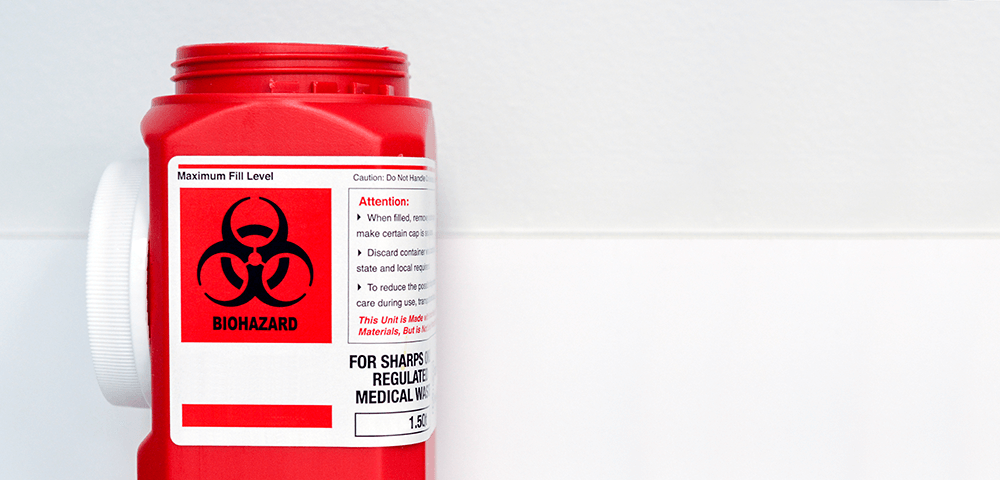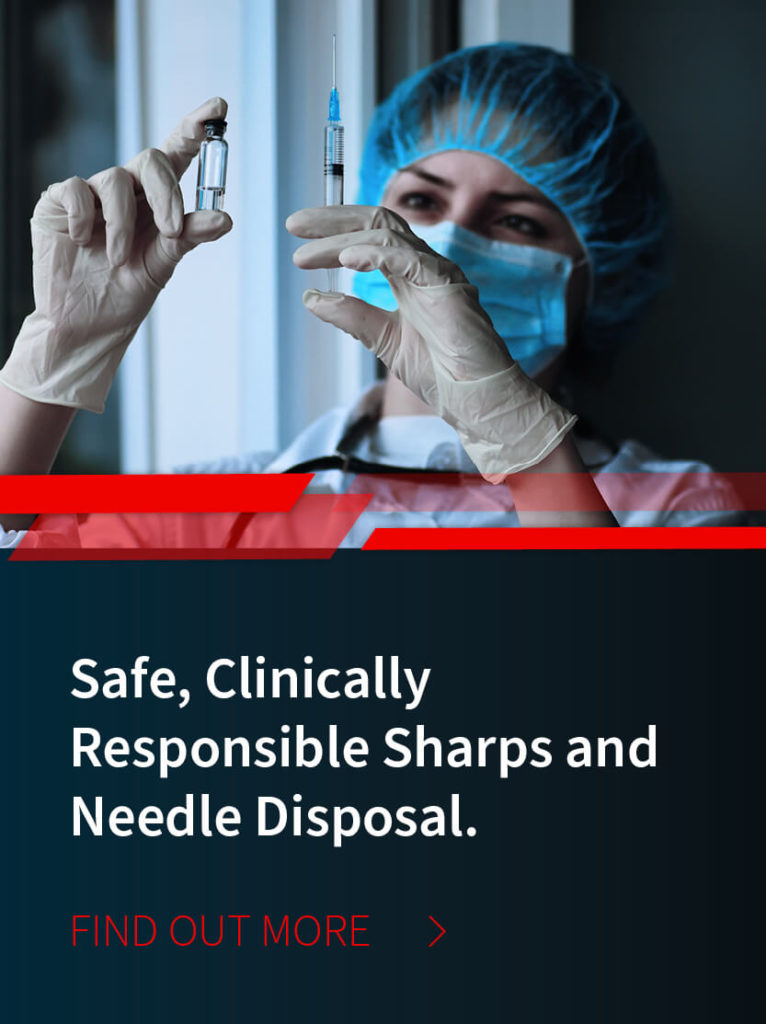
/ IN THIS BLOG
01 / What exactly constitutes a ‘Sharp’?
A sharp is anything with a rigid edge that can cut, stab, or puncture. They are quite common in the medical field and include everything from syringes and needles to scalpels and surgical knives.
Any entity that utilizes sharps should review the Federal Code of Regulations (CFR 49, Section 173.134(a)(7), which states that a sharp is ‘any object that may be contaminated with a pathogen and that are capable of cutting or penetrating skin or a packaging material.” This also includes culture dishes, broken glass, and any object that can pierce, poke, stab, or penetrate the skin.
Another resource for defining sharps can be found under ISO Standard 23907:2019.
Remember that sharps can also include lancets or other fingerstick instruments with two-edged blades, such as those used by diabetics. Auto injectors and EPI pens are also included, as are infusion sets and connector needle sets.
02 / Regulations for proper Sharps Disposal
Sharps compliance means properly disposing of used sharps in a sharps container according to federal, state, and local community guidelines. Sharps containers must comply with state and federal laws. Know how to properly label such containers, secure them for shipment, and follow up on ultimate treatment and disposal by a medical waste business that deals with used sharps and sharps containers.
Georgia regulations for medical waste guidelines can be found on the website of Georgia’s Department of Natural Resources and Georgia’s Environmental Protection Division. Georgia’s hazardous waste management regulations follow those of the federal government’s Resource Conservation and Recovery Act (RCRA).
The rules regarding sharps are applicable to any facility or business that uses any type of sharp (including barbers and cosmetology practices). For example, per the state of Georgia (Rule 240-4-.03. General Health and Safety): “Sharps such as razor blades should be disposed in a sharps container. Sharps containers must be stored upright, have OSHA biohazard labels, and have the manufacturer’s safety flap lid in place. Sharps containers must be properly disposed of when three-fourths (3/4) full. The Georgia Department of Natural Resources as well as local county and/or city ordinance regulates the proper disposal of waste containing sharps such as razor blades.”
Georgia’s regulations are clear in regard to hazardous waste management. Turn to Rule 391-3-12 (Hazardous Waste Management) for additional clarification of statues. Remember that Georgia follows guidelines of the federal government when it comes to such waste. In addition, the Georgia Hazardous Waste Management Act (O.C.G.A. 12-8-60 et seq.) provides specific details regarding the generation, transportation, treatment, storage, and disposal of hazardous wastes, per the RCRA.
Regardless of facility type, whether a dental clinic, nursing home, or veterinary practice, state and federal waste regulations pertaining to the disposal of used medical sharps apply.
03 / Disposing of Sharps Waste
Follow the rules for safe disposal of sharps waste. Where can you find the rules? You must follow both state and federal regulations. Review the Code of Federal Regulations (49 CFR 173.197), which states, “Sharps are to be placed in containers that are rigid, leak resistant, impervious to moisture, strong enough to prevent tearing or bursting during normal conditions of transport, and puncture resistant for sharps and sharps with residual fluids.”
After that, such containers can then be put in regulated medical waste containers for safe pickup. Puncture-resistant sharps containers can be obtained from a number of providers.
If your facility works with a medical waste management company, you should be able to purchase them from that company. Local labs may also provide them.
Work with a reputable full-service waste management company, such as MCF Environmental Services for access to compliant and puncture-resistant containers or resources for purchase. In addition to the provision of sharps containers, we provide full service sharps disposal which includes transport, processing and treatment.
MCF Environmental is more than a hazardous waste management company that shows up once a month to pick up biomedical or hazardous waste. We’re also a knowledgeable resource for compliant waste management. That includes what not to do with your sharps.
04 / What not to do with your Sharps
Without correct training, medical staff may be predisposed to throw their used needles loosely into cardboard boxes for their bio-hazard waste management company to then pick up and dispose of. This is extremely dangerous. If sharps are not properly packaged for disposal within a puncture-proof housing, it puts everyone in contact with those boxes at risk.
Should the needle, syringe, or scalpel cut or poke through its box, a driver or other member of the medical waste management company could be cut. This poses two equally serious concerns. One, the driver could be injured from the cut itself, and two, the individual could be exposed to any number of diseases, pathogens, or viruses from blood or other organic material on that sharp object.
For the safety of your medical personnel and patients or anyone else that may come into contact with the waste, proper sharps disposal methods are a must.
05 / Do Your Part
It’s easy to think that once you hire a medical waste management company, you don’t have much to do in terms of disposing of your material. You do. Remember:
Follow the rules when it comes to packaging that waste
Put sharps in puncture-resistant containers
Place only proper material in red bag waste
Check to ensure the company you work with is properly licensed for transport and disposal of hazardous and/or biomedical waste.
Waste management services like MCF Environmental want to keep you, your employees, and the public, safe. However, beyond our expertise, it’s the due diligence of healthcare facilities to do their part in keeping employees informed and educated on state and federal safety and hazardous waste regulations. If you ever have any questions about safety or disposal protocols for any medical waste, give us a call.
For more information about how to safely dispose of sharps and where to purchase compliant disposal equipment, contact a representative of MCF Environmental Services today.
Thank you for reading our blog.
Robert Losurdo
President, COO








